SONY DCR-TRV33, DCR-TRV33E, RMT-814 Service Manual
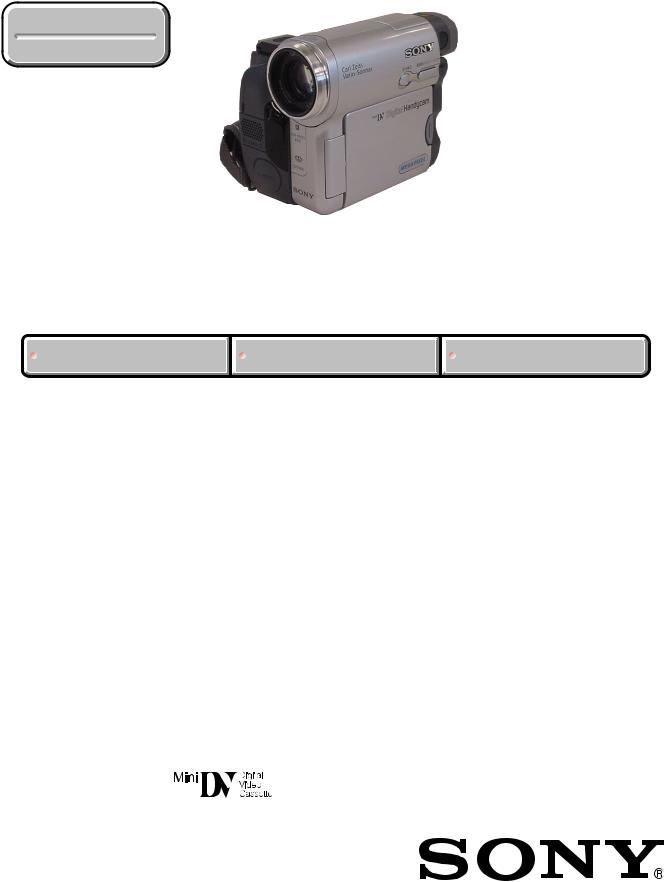
DCR-TRV33/TRV33E
|
|
|
|
RMT-814 |
|
|
|
|
|
|
|
SERVICE MANUAL |
|
|
|
||
|
LEVEL 1 |
||||
|
US Model |
||||
Ver 1.2 2003. 11 |
|
|
|||
|
Canadian Model |
||||
Revision History |
|
Korea Model |
|||
|
|
|
|
DCR-TRV33 |
|
|
|
|
AEP Model |
||
|
|
|
|
UK Model |
|
|
|
|
North European Model |
||
|
|
|
East European Model |
||
|
|
|
Chinese Model |
||
|
|
|
Australian Model |
||
|
|
|
|
DCR-TRV33E |
|
|
|
|
|
E Model |
|
|
|
|
Hong Kong Model |
||
|
|
Photo : DCR-TRV33 |
Tourist Model |
||
|
|
|
|||
Z MECHANISM |
|
|
DCR-TRV33/TRV33E |
||
|
|
|
|
|
|
|
|
|
|
|
|
Link |
|
|
|
|
|
SPECIFICATIONS |
SELF DIAGNOSIS FUNCTION |
ORNAMENTAL PARTS |
|
||
|
|
|
|
|
|
• INSTRUCTION MANUAL is shown at the end of this document.
DIGITAL VIDEO CAMERA RECORDER
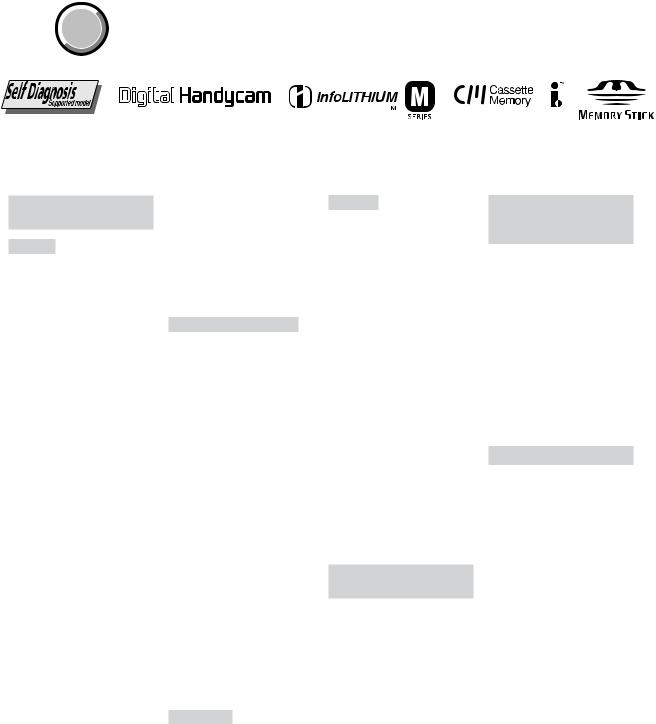
DCR-TRV33/TRV33E
COVER
Video camera
recorder
System
Video recording system
2 rotary heads
Helical scanning system
Audio recording system
Rotary heads, PCM system Quantization: 12 bits (Fs 32 kHz, stereo 1, stereo 2), 16 bits
(Fs 48 kHz, stereo)
Video signal
DCR-TRV33:
NTSC color, EIA standards DCR-TRV33E:
PAL colour, CCIR standards
Usable cassette
Mini DV cassette with the

 mark printed
mark printed
Tape speed
SP: Approx. 18.81 mm/s LP: Approx. 12.56 mm/s
Recording/playback time (using cassette DVM60)
SP: 1 hour LP: 1.5 hours
Fastforward/rewind time (using cassette DVM60)
Approx. 2 min. and 40 seconds
Viewfinder
Electric viewfinder (colour)
Image device
3.8 mm (1/4.7 type)
CCD (Charge Coupled Device) Gross: Approx. 1 070 000 pixels Effective (still):
Approx. 1 000 000 pixels Effective (moving): Approx. 690 000 pixels
Lens
Carl Zeiss Vario-Sonnar Combined power zoom lens Filter diameter: 30 mm
(1 3/16 in)
10× (Optical), 120× (Digital) F = 1.8 – 2.0
Focal length
3.7 – 37 mm (5/32 – 1 1/2 in.)1) 50 – 500 mm (2 – 19 3/4 in.)2) 42 – 420 mm (1 11/16 – 16 5/8 in.)3)
1)When converted to a 35 mm still camera
2)In CAMERA mode
3)In MEMORY mode
SPECIFICATIONS
Colour temperature
Auto, HOLD, INDOOR (3 200 K), OUTDOOR (5 800 K)
Minimum illumination
7 lx (lux) (F 1.8)
0 lx (lux) (in the NightShot mode)*
*Objects unable to be seen due to the dark can be shot with infrared lighting.
Input/Output connectors
S video input /output
4-pin mini DIN Luminance signal: 1 Vp-p, 75 Ω (ohms), unbalanced Chrominance signal: DCR-TRV33: 0.286 Vp-p, DCR-TRV33E: 0.3 Vp-p, 75 Ω (ohms), unbalanced
Audio/Video input /output
AV MINI JACK, 1 Vp-p, 75 Ω (ohms), unbalanced
327 mV, (at output impedance more than 47 kΩ (kilohms)) Output impedance with less than 2.2 kΩ (kilohms)/Stereo minijack (ø 3.5 mm)
Input impedance more than 47 kΩ (kilohms)
DV input/output
4-pin connector
Headphone jack
Stereo minijack (ø 3.5 mm)
LANC jack
Stereo mini-minijack (ø 2.5 mm)
USB jack mini-B
MIC jack
Minijack, 0.388 mV low impedance with 2.5 to 3.0 V DC, output impedance 6.8 kΩ (kilohms)
(ø 3.5 mm) Stereo type
LCD screen
Picture
6.2 cm (2.5 type)
50.3 × 37.4 mm (2 × 1 1/2 in.)
Total dot number
123 200 (560 × 220)
General
Power requirements
7.2 V (battery pack)
8.4 V (AC Adaptor)
Average power consumption (when using the battery pack)
DCRTRV33 :4.1 W 1)
DCRTRV33E:4.0 W 1)
DCRTRV33 :3.3 W 2)
DCRTRV33E:3.2 W 2)
1)During camera recording using LCD
2)Viewfinder
Operating temperature
0° C to 40° C (32° F to 104° F)
Storage temperature
–20° C to + 60° C (–4° F to + 140° F)
Dimensions (approx.)
71 × 90 × 112 mm
(2 7/8 × 3 5/8 × 4 1/2 in.) (w/h/d)
Mass (approx.)
Main unit only 540 g (1 lb 2 oz)
Including the rechargeable battery pack NP-FM30, cassette DVM60 and lens cap
630 g (1 lb 5 oz)
Supplied accessories
See page 3.
AC Adaptor
AC-L15A/L15B
Power requirements
100 – 240 V AC, 50/60 Hz
Current consumption
0.35 – 0.18 A
Power consumption
18 W
Output voltage
DC OUT: 8.4 V, 1.5 A
Operating temperature
0° C to 40° C (32° F to 104° F)
Storage temperature
–20° C to + 60° C (–4° F to + 140° F)
Dimensions (approx.)
56 × 31 × 100 mm
(2 1/4 × 1 1/4 × 4 in.) (w/h/d) excluding projecting parts
Mass (approx.)
190 g (6.7 oz) excluding power cord
Rechargeable battery pack NP-FM30
Maximum output voltage
DC 8.4 V
Output voltage
DC 7.2 V
Capacity
5.0 Wh (700 mAh)
Dimensions (approx.)
38.2 × 20.5 × 55.6 mm
(1 9/16 × 13/16 × 2 1/4 in.) (w/h/d)
Mass (approx.)
65 g (2.3 oz)
Operating temperature
0° C to 40° C (32° F to 104° F)
Type
Lithium ion
“Memory Stick”
Memory
Flash memory 8MB: MSA-8A
Operating voltage
2.7 – 3.6 V
Power consumption
Approx. 45 mA during operation mode
Approx. 130 µ A during tape recording standby
Dimensions (approx.)
50 × 2.8 × 21.5 mm
(2 × 1/8 × 7/8 in.) (w/h/d)
Mass (approx.)
4 g (0.14 oz)
Design and specifications are subject to change without notice.
— 2 —
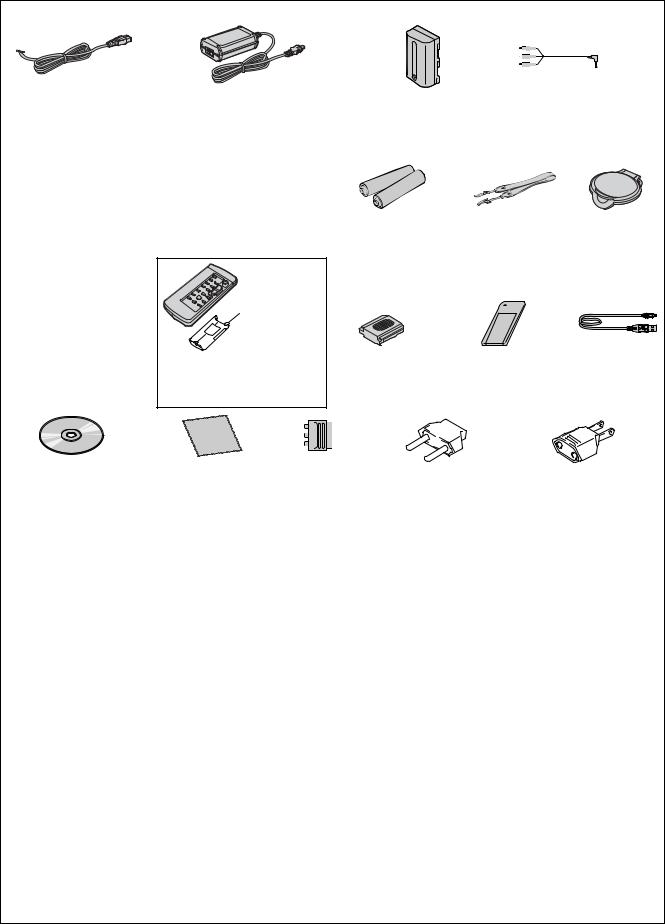
DCR-TRV33/TRV33E
Ver 1.1 2003. 06
Checking supplied accessories.
Make sure that the following accessories are supplied with your camcorder.
Power cord (Main lead)(1) (AUS model)
0 1-696-819-21
Power cord (Main lead)(1) (AEP, E, EE, NE model) 0 1-769-608-11
Power cord (Main lead)(1) (CH model)
0 1-782-476-11
Power cord (Main lead)(1)
(UK, HK model)
0 1-783-374-11
Power cord (Main lead)(1) (US, CND model)
0 1-790-107-22
Power cord (Main lead)(1)
(JE model)
0 1-790-732-11
Power cord (Main lead)(1) (KR model)
0 1-776-985-11
AC power adaptor (1) (AC-L15A) |
NP-FM30 battery pack (1) |
A/V connecting cable |
|
0 A-7096-387-A |
(1.5m) (1) |
||
(US,CND,AEP,UK,EE,NE,E, |
|||
AUS,HK,KR,JE model) |
(US, CND model) |
1-824-097-11 |
|
0 1-477-533-31 |
0 A-7096-388-B |
|
|
AC power adaptor (1) (AC-L15B) |
(Except US, CND model) |
|
(CH model)
0 1-477-533-41
|
R6 (size AA) batteries |
Shoulder strap (1) |
Lens cap (1) |
|
for the Remote |
3-987-015-01 |
X-3953-088-1 |
|
Commander (2) |
|
|
|
(not supplied) |
|
|
Lid Battery |
|
|
|
Case |
|
|
|
(3-742-854-01) |
|
|
|
Wireless Remote Commander (1) |
Shoe cover (1) |
“Memory Stick” (1) |
USB cable (1) |
(RMT-814E) |
3-080-571-01 |
(MSA-8A) |
1-823-931-11 |
1-475-141-61 |
|
A-7024-735-A |
|
CD-ROM
(SPVD-008 USB Driver) (1) (AEP, UK, EE, NE, E, HK, AUS,
JE, KR, CH model) 3-078-942-01 CD-ROM
(SPVD-008(I) USB Driver) (1) (US,CND model)
3-078-943-01
Cleaning cloth (1) |
21-pin adaptor (1) |
2-pin conversion adaptor (1) |
2-pin conversion adaptor (1) |
3-073-861-01 |
(AEP, UK, EE, NE |
(TRV33:JE/TRV33E:JE |
(TRV33:E,HK/TRV33E:E,HK |
|
model) |
only) |
only) |
|
1-770-783-21 |
1-569-007-12 |
1-569-008-12 |
• Abbreviation |
|
|
|
CND : Canadian model |
AUS |
: Australian model |
|
EE |
: East European model |
CH |
: Chinese model |
NE |
: North European model |
JE |
: Tourist model |
HK |
: Hong Kong model |
KR |
: Korea model |
Other accessories |
|
|
|
|
|
|
3-080-369-11 |
MANUAL, INSTRUCTION (ENGLISH) |
3-080-368-51 |
MANUAL, INSTRUCTION (SWEDISH/RUSSIAN) |
|||
|
(TRV33:US,CND,E,HK,JE) |
|
|
|
(TRV33E:NE,E,JE) |
|
3-080-369-21 |
MANUAL, INSTRUCTION (FRENCH)(TRV33:CND) |
3-080-368-61 |
MANUAL, INSTRUCTION (DANISH/FINNISH) |
|||
3-080-369-31 |
MANUAL, INSTRUCTION (SPANISH/PORTUGUESE) |
|
|
|
(TRV33E:NE) |
|
|
(TRV33:E,JE) |
3-080-368-71 |
MANUAL, INSTRUCTION (ARABIC/PERSIAN) |
|||
3-080-369-41 MANUAL, INSTRUCTION (TRADITIONAL CHINESE) |
|
|
|
(TRV33E:E) |
||
|
(TRV33:E,HK) |
3-080-368-81 MANUAL, INSTRUCTION (TRADITIONAL CHINESE) |
||||
3-080-369-51 MANUAL, INSTRUCTION (KOREAN) (TRV33:JE,KR) |
|
|
|
(TRV33E:HK) |
||
3-080-369-61 MANUAL, INSTRUCTION (ARABIC) (TRV33:E) |
3-080-368-91 MANUAL, INSTRUCTION (SIMPLIFIED CHINESE) |
|||||
|
|
|
(TRV33E:E,CH,JE) |
|||
3-080-368-11 |
MANUAL, INSTRUCTION (ENGLISH/FRENCH) |
|
|
|
|
|
|
(TRV33E:AEP,UK,AUS,CH,HK,JE) |
|
Note : |
|
Note : |
|
3-080-368-21 |
MANUAL, INSTRUCTION (SPANISH/PORTUGUESE) |
|
The components identified by |
Les composants identifiés par |
|
|
|
(TRV33E:AEP) |
|
mark 0 or dotted line with mark |
une marque 0 sont critiques |
|
|
3-080-368-31 MANUAL, INSTRUCTION (ITALIAN/GREEK) (TRV33E:AEP) |
|
0 are critical for safety. |
pour la sécurité. |
|
||
3-080-368-41 |
MANUAL, INSTRUCTION (GERMAN/DUTCH) |
|
Replace only with part number |
Ne les remplacer que par une |
|
|
|
specified. |
|
pièce portant le numéro spécifié. |
|
||
|
(TRV33E:AEP) |
|
|
|
||
|
|
|
|
|
|
|
|
|
|
|
|
|
|
|
|
|
|
|
|
|
— 3 —

DCR-TRV33/TRV33E
SAFETY-RELATED COMPONENT WARNING!!
COMPONENTS IDENTIFIED BY MARK 0OR DOTTED LINE WITH MARK 0 ON THE SCHEMATIC DIAGRAMS AND IN THE PARTS
LIST ARE CRITICAL TO SAFE OPERATION. REPLACE THESE COMPONENTS WITH SONY PARTS WHOSE PART NUMBERS APPEAR AS SHOWN IN THIS MANUAL OR IN SUPPLEMENTS PUBLISHED BY SONY.
CAUTION :
Danger of explosion if battery is incorrectly replaced. Replace only with the same or equivalent type.
ATTENTION AU COMPOSANT AYANT RAPPORT
À LA SÉCURITÉ!
LES COMPOSANTS IDENTIFÉS PAR UNE MARQUE 0 SUR LES
DIAGRAMMES SCHÉMATIQUES ET LA LISTE DES PIÈCES SONT CRITIQUES POUR LA SÉCURITÉ DE FONCTIONNEMENT. NE REMPLACER CES COMPOSANTS QUE PAR DES PIÈSES SONY DONT LES NUMÉROS SONT DONNÉS DANS CE MANUEL OU DANS LES SUPPÉMENTS PUBLIÉS PAR SONY.
SAFETY CHECK-OUT
After correcting the original service problem, perform the following
safety checks before releasing the set to the customer.
1.Check the area of your repair for unsoldered or poorly-soldered connections. Check the entire board surface for solder splashes and bridges.
2.Check the interboard wiring to ensure that no wires are "pinched" or contact high-wattage resistors.
3.Look for unauthorized replacement parts, particularly transistors, that were installed during a previous repair. Point them out to the customer and recommend their replacement.
4.Look for parts which, through functioning, show obvious signs of deterioration. Point them out to the customer and recommend their replacement.
5.Check the B+ voltage to see it is at the values specified.
6.Flexible Circuit Board Repairing
•Keep the temperature of the soldering iron around 270˚C during repairing.
•Do not touch the soldering iron on the same conductor of the circuit board (within 3 times).
•Be careful not to apply force on the conductor when soldering or unsoldering.
— 4 —
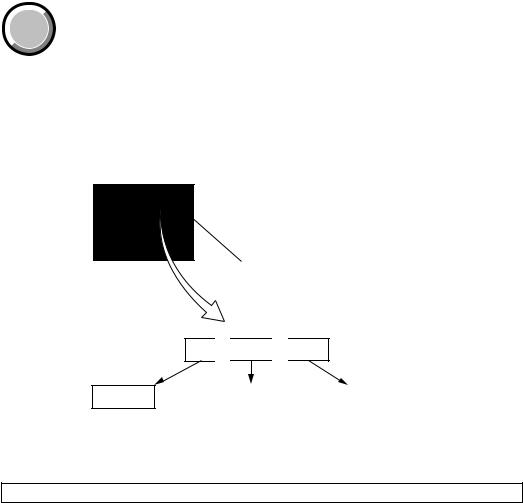
DCR-TRV33/TRV33E
COVER |
SELF-DIAGNOSIS FUNCTION |
1.SELF-DIAGNOSIS FUNCTION
When problems occur while the unit is operating, the self-diagnosis function starts working, and displays on the viewfinder, or LCD screen what to do.
Details of the self-diagnosis functions are provided in the Instruction manual.
Viewfinder or LCD screen
C : 3 1 : 1 1
2.SELF-DIAGNOSIS DISPLAY
When problems occur while the unit is operating, the counter of the viewfinder or LCD screen consists of an alphabet and 4-digit number, which blinks at 3.2Hz. This 5-character display indicates the “repaired by:”, “block” in which the problem occurred, and “detailed code” of the problem.
Blinks at 3.2Hz
C 


 3 1
3 1 

 1 1
1 1
Repaired by:
C : Corrected by customer H : Corrected by dealer
E : Corrected by service engineer
|
|
Block |
|
|
Detailed Code |
|
|
|
|
|
|
|
|
Indicates the appropriate |
Refer to page 6. |
|||||
step to be taken. |
Self-diagnosis Code Table. |
|||||
E.g. |
|
|
|
|||
31 |
....Reload the tape. |
|
|
|
||
32 |
....Turn on power again. |
|
|
|
||
Note: The “self-diagnosis display” data will be kept even if the lithium battery (BT5201 of CK-129 board) is removed.
— 5 —
DCR-TRV33/TRV33E
Ver 1.2 2003. 11
3.SELF-DIAGNOSIS CODE TABLE
Self-diagnosis Code |
|
|
|||||
|
|
|
|
|
|
|
|
by: |
Block |
Detailed |
Symptom/State |
Correction |
|||
Repaired |
|||||||
Function |
Code |
|
|
||||
|
|
|
|||||
|
|
|
|
|
|
|
|
C |
0 |
4 |
0 |
0 |
Non-standard battery is used. |
Use the info LITHIUM battery. |
|
|
|
|
|
|
|
|
|
C |
2 |
1 |
0 |
0 |
Condensation. |
Remove the cassette, and insert it again after one hour. |
|
|
|
|
|
|
|
|
|
C |
2 |
2 |
0 |
0 |
Video head is dirty. |
Clean with the optional cleaning cassette. |
|
|
|
|
|
|
|
|
|
C |
3 |
1 |
1 |
0 |
LOAD direction. Loading does not |
Load the tape again, and perform operations from the beginning. |
|
|
|
|
|
|
complete within specified time |
||
|
|
|
|
|
|
||
|
|
|
|
|
|
|
|
C |
3 |
1 |
1 |
1 |
UNLOAD direction. Loading does not |
Load the tape again, and perform operations from the beginning. |
|
|
|
|
|
|
complete within specified time |
||
|
|
|
|
|
|
||
|
|
|
|
|
|
|
|
C |
3 |
1 |
2 |
0 |
T reel side tape slacking when unloading. |
Load the tape again, and perform operations from the beginning. |
|
|
|
|
|
|
|
|
|
C |
3 |
1 |
2 |
1 |
Winding S reel fault when counting the |
Load the tape again, and perform operations from the beginning. |
|
|
|
|
|
|
rest of tape. |
||
|
|
|
|
|
|
||
|
|
|
|
|
|
|
|
C |
3 |
1 |
2 |
2 |
T reel fault. |
Load the tape again, and perform operations from the beginning. |
|
|
|
|
|
|
|
|
|
C |
3 |
1 |
2 |
3 |
S reel fault. |
Load the tape again, and perform operations from the beginning. |
|
|
|
|
|
|
|
|
|
C |
3 |
1 |
2 |
4 |
T reel fault. |
Load the tape again, and perform operations from the beginning. |
|
|
|
|
|
|
|
|
|
C |
3 |
1 |
3 |
0 |
FG fault when starting capstan. |
Load the tape again, and perform operations from the beginning. |
|
|
|
|
|
|
|
|
|
C |
3 |
1 |
4 |
0 |
FG fault when starting drum. |
Load the tape again, and perform operations from the beginning. |
|
|
|
|
|
|
|
|
|
C |
3 |
1 |
4 |
2 |
FG fault during normal drum operations. |
Load the tape again, and perform operations from the beginning. |
|
|
|
|
|
|
|
|
|
C |
3 |
2 |
1 |
0 |
LOAD direction loading motor time- |
Remove the battery or power cable, connect, and perform |
|
out. |
operations from the beginning. |
||||||
|
|
|
|
|
|||
|
|
|
|
|
|
|
|
C |
3 |
2 |
1 |
1 |
UNLOAD direction loading motor |
Remove the battery or power cable, connect, and perform |
|
time-out. |
operations from the beginning. |
||||||
|
|
|
|
|
|||
|
|
|
|
|
|
|
|
C |
3 |
2 |
2 |
0 |
T reel side tape slacking when |
Remove the battery or power cable, connect, and perform |
|
unloading. |
operations from the beginning. |
||||||
|
|
|
|
|
|||
|
|
|
|
|
|
|
|
C |
3 |
2 |
2 |
1 |
Winding S reel fault when counting the |
Remove the battery or power cable, connect, and perform |
|
rest of tape. |
operations from the beginning. |
||||||
|
|
|
|
|
|||
|
|
|
|
|
|
|
|
C |
3 |
2 |
2 |
2 |
T reel fault. |
Remove the battery or power cable, connect, and perform |
|
operations from the beginning. |
|||||||
|
|
|
|
|
|
||
|
|
|
|
|
|
|
|
C |
3 |
2 |
2 |
3 |
S reel fault. |
Remove the battery or power cable, connect, and perform |
|
operations from the beginning. |
|||||||
|
|
|
|
|
|
||
|
|
|
|
|
|
|
|
C |
3 |
2 |
2 |
4 |
T reel fault. |
Remove the battery or power cable, connect, and perform |
|
operations from the beginning. |
|||||||
|
|
|
|
|
|
||
|
|
|
|
|
|
|
|
C |
3 |
2 |
3 |
0 |
FG fault when starting capstan. |
Remove the battery or power cable, connect, and perform |
|
operations from the beginning. |
|||||||
|
|
|
|
|
|
||
|
|
|
|
|
|
|
|
C |
3 |
2 |
4 |
0 |
FG fault when starting drum |
Remove the battery or power cable, connect, and perform |
|
operations from the beginning. |
|||||||
|
|
|
|
|
|
||
|
|
|
|
|
|
|
|
C |
3 |
2 |
4 |
2 |
FG fault during normal drum |
Remove the battery or power cable, connect, and perform |
|
operations |
operations from the beginning. |
||||||
|
|
|
|
|
|||
|
|
|
|
|
|
|
|
Note: Add the sentence as follows.
If other codes are displayed, service is required.
Please send the set to a specialized center.
— 6 —
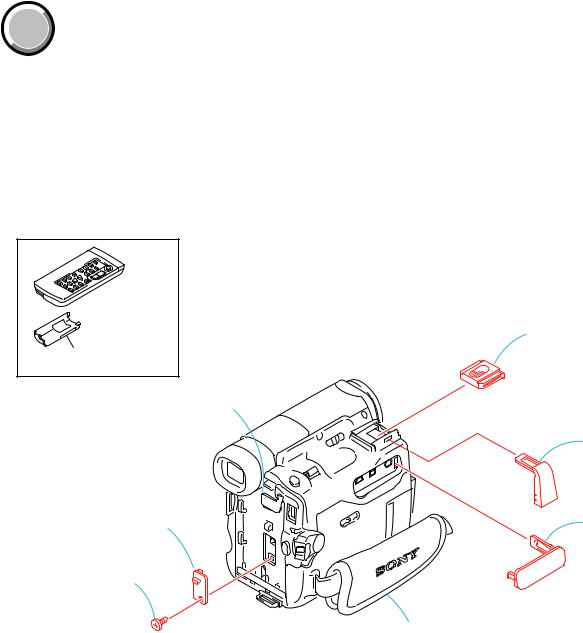
COVER |
MAIN PARTS |
Note:
•Follow the disassembly procedure in the numerical order given.
•Items marked “*” are not stocked since they are seldom required for routine service. Some delay should be anticipated when ordering these items.
•The parts numbers of such as a cabinet are also appeared in this section. Refer to the parts number mentioned below the name of parts to order.
1.ORNAMENTAL PARTS
Remote commander (RMT-814E) 1-475-141-61
Battery case lid (for RMT-814E) 3-742-854-01
DC-IN jack cover
Note: Disassembling the main unit is necessary to replace it.
CPC lid (3-080-570-01)
Screw
(M1.7 × 4), lock ace, p2 (3-989-735-81)
Grip belt
DCR-TRV33/TRV33E
Shoe cover (3-080-571-01)
Jack cover (F) (3-080-573-01)
Jack cover (L) (3-080-572-01)
Note: Disassembling the main unit is necessary to replace it.
— 7 —
DCR-TRV33/TRV33E
9-876-223-41 |
Sony EMCS Co. |
|
— 8 — |
||
|
2003K1600-1 ©2003.11
Published by DI CS Strategy Div.

3-080-369-11(1)
Digital
Video Camera
Recorder


Operating Instructions
Before operating the unit, please read this manual thoroughly, and retain it for future reference.
Owner’s Record
The model and serial numbers are located on the bottom. Record the serial number in the space provided below. Refer to these numbers whenever you call upon your Sony dealer regarding this product.
Model No. DCR-TRV ____________________ Model No. AC________________________
Serial No. _____________________________ Serial No. _____________________________
DCR-TRV33
DCR-TRV19/TRV22/TRV33
©2003 Sony Corporation
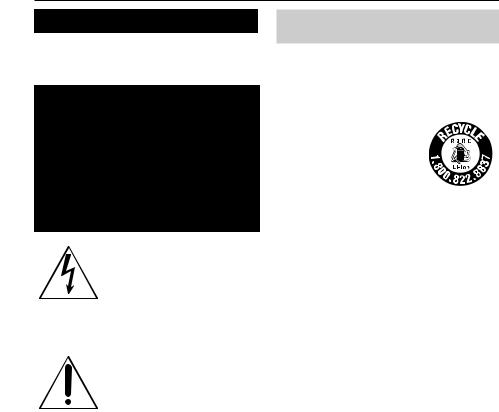
Welcome!
Congratulations on your purchase of this Sony Handycam. With your Handycam, you can capture life’s precious moments with superior picture and sound quality. Your Handycam is loaded with advanced features, but at the same time it is very easy to use. You will soon be producing home video that you can enjoy for years to come.
WARNING
To prevent fire or shock hazard, do not expose the unit to rain or moisture.
This symbol is intended to alert the user to the presence of uninsulated “dangerous voltage” within the product’s enclosure that may be of sufficient magnitude to constitute a risk of electric shock to persons.
This symbol is intended to alert the user to the presence of important operating and maintenance (servicing) instructions in the literature accompanying the appliance.
Notice
If static electricity or electromagnetism causes data transfer to discontinue midway (fail), restart the application or disconnect and connect the USB cable again.
For customers in the U.S.A.
and CANADA
CAUTION
TO PREVENT ELECTRIC SHOCK, MATCH WIDE BLADE OF PLUG TO WIDE SLOT, FULLY INSERT.
RECYCLING LITHIUM-ION BATTERIES
Lithium-Ion batteries are
recyclable. You can help preserve our
environment by returning your used rechargeable batteries to the collection and recycling location nearest you.
For more information regarding recycling of rechargeable batteries, call toll free 1-800-822- 8837, or visit http://www.rbrc.org/
Caution: Do not handle damaged or leaking Lithium-Ion batteries.
“Memory Stick” (DCR-TRV22/ TRV33 only)
This device complies with Part 15 of the FCC Rules. Operation is subject to the following two conditions: (1) This device may not cause harmful interference, and (2) this device must accept any interference received, including interference that may cause undesired operation.
This Class B digital apparatus complies with Canadian ICES-003.
2

For customers in the U.S.A.
If you have any questions about this product, you may call:
Sony Customer Information Center 1-800-222- SONY (7669)
The number below is for the FCC related matters only.
Regulatory Information
Declaration of Conformity
Trade Name: |
SONY |
Model No.: |
DCR-TRV19 |
Responsible Party: |
Sony Electronics Inc. |
Address: |
680 Kinderkamack |
|
Road, Oradell, |
|
NJ07649 U.S.A. |
Telephone No.: |
201-930-6972 |
This device complies with Part 15 of the FCC Rules. Operation is subject to the following two conditions: (1) This device may not cause harmful interference, and (2)this device must accept any interference received, including interference that may cause undesired operation.
Declaration of Conformity
Trade Name: |
SONY |
Model No.: |
DCR-TRV22 |
Responsible Party: |
Sony Electronics Inc. |
Address: |
680 Kinderkamack |
|
Road, Oradell, |
|
NJ07649 U.S.A. |
Telephone No.: |
201-930-6972 |
This device complies with Part 15 of the FCC Rules. Operation is subject to the following two conditions: (1) This device may not cause harmful interference, and (2)this device must accept any interference received, including interference that may cause undesired operation.
Declaration of Conformity
Trade Name: |
SONY |
Model No.: |
DCR-TRV33 |
Responsible Party: |
Sony Electronics Inc. |
Address: |
680 Kinderkamack |
|
Road, Oradell, |
|
NJ07649 U.S.A. |
Telephone No.: |
201-930-6972 |
This device complies with Part 15 of the FCC Rules. Operation is subject to the following two conditions: (1) This device may not cause harmful interference, and (2)this device must accept any interference received, including interference that may cause undesired operation.
CAUTION
You are cautioned that any changes or modifications not expressly approved in this manual could void your authority to operate this equipment.
Note:
This equipment has been tested and found to comply with the limits for a Class B digital device, pursuant to Part 15 of the FCC Rules. These limits are designed to provide reasonable protection against harmful interference in a residential installation. This equipment generates, uses, and can radiate radio frequency energy and, if not installed and used in accordance with the instructions, may cause harmful interference to radio communications. However, there is no guarantee that interference will not occur in a particular installation. If this equipment does cause harmful interference to radio or television reception, which can be determined by turning the equipment off and on, the user is encouraged to try to correct the interference by one or more of the following measures:
—Reorient or relocate the receiving antenna.
—Increase the separation between the equipment and receiver.
—Connect the equipment into an outlet on a circuit different from that to which the receiver is connected.
—Consult the dealer or an experienced radio/TV technician for help.
The supplied interface cable must be used with the equipment in order to comply with the limits for a digital device pursuant to Subpart B of Part 15 of FCC Rules.
3
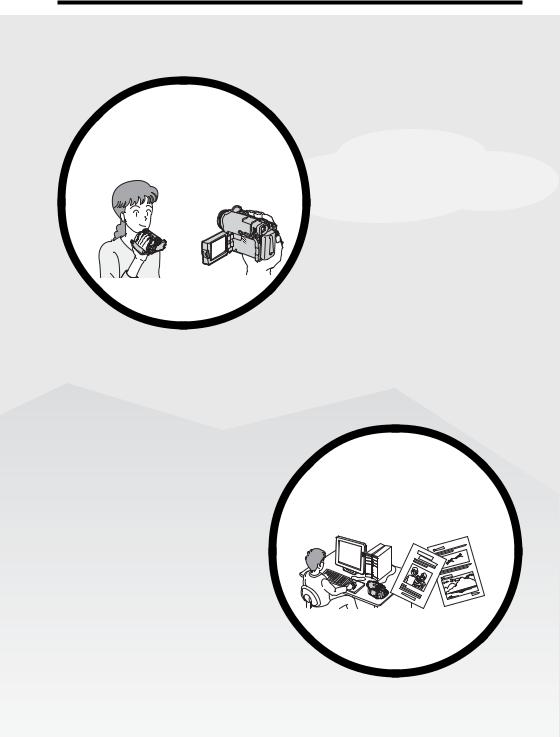
Main Features
Recording moving pictures or still images, and playing them back
Features Main
•Viewing moving pictures recorded on the tape using the USB cable (p. 148)
•Viewing images recorded on the “Memory Stick” using the USB cable (DCR-TRV22/TRV33 only) (p. 149)
•Capturing images on the computer from your camcorder using the USB cable (p. 161)
•Converting an analog signal into digital to capture images onto the computer (DCR-TRV22/TRV33 only) (p. 173)
•Recording moving pictures on the tape (p. 25)
•Playing back the tape (p. 39) •Recording still images on the
“Memory Stick” (DCR-TRV22/ TRV33 only) (p. 46, 114)
•Recording moving pictures on the “Memory Stick” (DCR-TRV22/ TRV33 only) (p. 125)
•Viewing still images recorded on the “Memory Stick” (DCR-TRV22/ TRV33 only) (p. 135)
•Viewing moving pictures recorded on the “Memory Stick” (DCRTRV22/TRV33 only) (p. 137)
Capturing images on the computer
4

Main Features
Other uses
Functions for adjusting exposure during recording
•Back light (p. 33)
•NightShot/Super NightShot*/Color Slow Shutter* (p. 34) •PROGRAM AE (p. 62)
•Manual exposure (p. 64) •Flexible Spot Meter (p. 65)
Functions for giving images more impact
•Digital zoom (p. 32)
The default setting is OFF. (To zoom greater than 10× ,
select the digital zoom power in D ZOOM in the menu settings.) •Fader (p. 55)
•Picture effect (p. 58, 72) •Digital effect* (p. 59, 73) •Title (p. 101)
•MEMORY MIX* (p. 120)
Functions for giving a natural appearance to your recordings
•PROGRAM AE (p. 62)
–SPORTS
–LANDSCAPE •Manual focus (p. 66) •Spot Focus (p. 67)
Functions for using after recording
•End search/Edit search/Rec Review (p. 37) •Data code (p. 40)
•Tape PB ZOOM* (p. 74)/Memory PB ZOOM* (p. 140) •Zero set memory (p. 75)
•Title search (p. 76)
•Digital program editing (p. 84, 130*)
* DCR-TRV22/TRV33 only
Before you start reading this manual and operating your camcorder, check the model number by looking at the bottom of your camcorder. The DCR-TRV33 is the model used for illustration purposes. Otherwise, the model name is indicated in the illustrations. Any differences in operation are clearly indicated in the text, for example, “DCR-TRV33 only.”
Started Getting
Features Main
5

Table of contents
Main Features ........................ |
4 |
Quick Start Guide |
|
Recording on tape ................................... |
8 |
Recording on “Memory Stick” |
|
(DCR-TRV22/TRV33 only) ........... |
10 |
Getting Started |
|
Using this manual ................................. |
12 |
Checking supplied accessories ............ |
15 |
Step 1 Preparing the power source..... |
16 |
Installing the battery pack ............. |
16 |
Charging the battery pack ............. |
17 |
Checking status of battery pack – |
|
Battery Info ............................... |
20 |
Connecting to a wall outlet ........... |
21 |
Step 2 Setting the date and time ......... |
22 |
Step 3 Using the touch panel ............... |
23 |
Recording – Basics |
|
Recording a picture ............................... |
25 |
Shooting backlit subjects |
|
– Back light function ................ |
33 |
Shooting in the dark |
|
– NightShot/Super NightShot/ |
|
Color Slow Shutter .................. |
34 |
Checking recordings |
|
– End search/Edit search/Rec |
|
Review ............................................. |
37 |
Playback – Basics |
|
Playing back tape .................................. |
39 |
To display the screen indicators – |
|
Display function ...................... |
40 |
Viewing a recording on TV ................. |
44 |
Advanced Recording |
|
Operations |
|
Recording still images on “Memory |
|
Stick” during tape recording |
|
standby or tape recording |
|
(DCR-TRV22/TRV33 only) ........... |
46 |
Recording a still image on a tape |
|
– Tape Photo recording |
|
(DCR-TRV19 only) ......................... |
48 |
Self-timer recording .............................. |
50 |
Adjusting the white balance |
|
manually .......................................... |
52 |
Using the wide mode ........................... |
53 |
Using the fader function ...................... |
55 |
Using special effects – Picture effect .. |
58 |
Using special effects – Digital effect |
|
(DCR-TRV22/TRV33 only) ........... |
59 |
Using PROGRAM AE .......................... |
62 |
Adjusting the exposure manually ...... |
64 |
Using spot light-metering function |
|
– Flexible Spot Meter ..................... |
65 |
Focusing manually ................................ |
66 |
Using spot focus function |
|
– Spot Focus .................................... |
67 |
Interval Recording ................................ |
68 |
Frame by frame recording |
|
– Frame recording .......................... |
69 |
Using the viewfinder ............................ |
70 |
Advanced Playback |
|
Operations |
|
Playing back tape with picture effect . 72 |
|
Playing back tape with digital effect |
|
(DCR-TRV22/TRV33 only) ........... |
73 |
Enlarging images recorded on tape |
|
– Tape PB ZOOM (DCR-TRV22/ |
|
TRV33 only) .................................... |
74 |
Quickly locating a scene |
|
– Zero set memory ......................... |
75 |
Searching the boundaries of recorded |
|
tape by title – Title search ............. |
76 |
Searching a recording by date |
|
– Date search ................................... |
77 |
Searching for a photo – Photo search/ |
|
Photo scan (DCR-TRV19 only) ..... |
79 |
Editing |
|
Dubbing tape ......................................... |
81 |
Dubbing only desired scenes |
|
– Digital program editing |
|
(on tape) ........................................... |
84 |
Recording video or TV programs ....... |
93 |
Inserting a scene from a VCR |
|
– Insert editing ................................ |
95 |
Audio dubbing ...................................... |
97 |
Superimposing a title on a cassette |
|
with Cassette Memory ................. |
101 |
Making your own titles ...................... |
103 |
Labeling a cassette on a cassette |
|
with Cassette Memory ................. |
104 |
Erasing all the data in Cassette |
|
Memory ......................................... |
105 |
6

Table of contents
“Memory Stick” Operations (DCR-TRV22/TRV33 only)
Using “Memory Stick” ....................... |
106 |
Inserting/Ejecting the |
|
“Memory Stick” ............................ |
109 |
Selecting image quality and size ....... |
110 |
Recording still images on “Memory |
|
Stick” – Memory Photo |
|
recording ....................................... |
114 |
Recording an image from tape as |
|
a still image ................................... |
118 |
Superimposing a still image in |
|
“Memory Stick” on an image |
|
– MEMORY MIX .......................... |
120 |
Interval Photo Recording ................... |
124 |
Recording moving pictures on |
|
“Memory Stick” – MPEG MOVIE |
|
recording ....................................... |
125 |
Self-timer recording ............................ |
127 |
Recording a picture from tape as a |
|
moving picture ............................. |
128 |
Recording edited pictures from |
|
tape as a moving picture – Digital |
|
program editing (on “Memory |
|
Stick”) ............................................. |
130 |
Changing the recording folder .......... |
133 |
Viewing a still image |
|
– Memory Photo playback .......... |
135 |
Viewing a moving picture |
|
– MPEG MOVIE playback .......... |
137 |
Choosing a playback folder ............... |
139 |
Enlarging still images recorded on |
|
“Memory Stick” – Memory PB |
|
ZOOM ............................................ |
140 |
Playing back images continuously |
|
– Slide show .................................. |
141 |
Preventing accidental erasure |
|
– Image protection ........................ |
142 |
Deleting images – DELETE ............... |
143 |
Changing image size – Resize |
|
(DCR-TRV33 only) ....................... |
146 |
Writing a print mark – Print mark ... |
147 |
Viewing pictures recorded on tape on a |
|
computer – USB Streaming (For |
|
Windows users) ............................ |
161 |
Viewing images recorded on |
|
“Memory Stick” on a computer |
|
(For Windows users) |
|
(DCR-TRV22/TRV33 only) ......... |
167 |
Connecting your camcorder to a |
|
computer using the USB cable |
|
(For Macintosh users) |
|
(DCR-TRV22/TRV33 only) ......... |
170 |
Viewing images recorded on |
|
“Memory Stick” on a computer |
|
(For Macintosh users) |
|
(DCR-TRV22/TRV33 only) ......... |
172 |
Capturing images from an analog |
|
video unit on a computer – Signal |
|
convert function (DCR-TRV22/ |
|
TRV33 only) .................................. |
173 |
Customizing Your Camcorder |
|
Changing the menu settings .............. |
175 |
Troubleshooting |
|
Types of trouble and how to correct |
|
trouble ............................................ |
186 |
Self-diagnosis display ......................... |
194 |
Warning indicators ............................. |
195 |
Warning messages .............................. |
196 |
Additional Information |
|
Usable cassettes ................................... |
197 |
About the “InfoLITHIUM” battery |
|
pack ................................................ |
200 |
About i.LINK ....................................... |
202 |
Using your camcorder abroad .......... |
204 |
Maintenance information and |
|
precautions .................................... |
205 |
Specifications ....................................... |
211 |
Quick Reference |
|
Identifying parts and controls ........... |
213 |
Index ..................................................... |
219 |
Viewing images with your |
|
computer |
|
Viewing images with a computer |
|
– Introduction ............................... |
148 |
Connecting your camcorder to a |
|
computer using the USB cable |
|
(For Windows users) .................... |
151 |
Started Getting
7
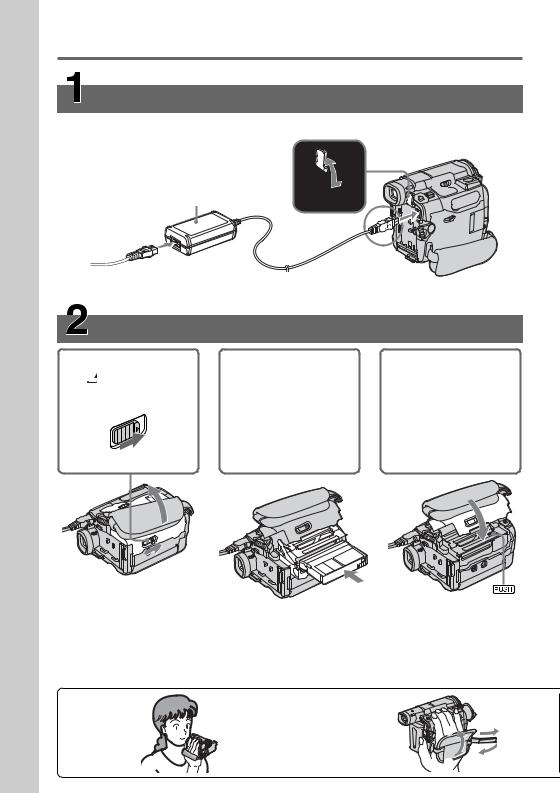
Guide Start Quick
8
Quick Start Guide – Recording on tape
Connecting the power cord (p. 17)
Use the battery pack when using your camcorder outdoors (p. 16).
Open the DC IN jack cover.
AC Adaptor (supplied)
1
 2 3
2 3
Connect the plug with its v mark facing the battery.
Inserting the cassette
1 Slide OPEN/ZEJECT |
2 Push the center of the |
in the direction of |
cassette back to insert |
the arrow and open |
the cassette. Insert the |
the lid. |
cassette straight as far |
|
as possible into the |
|
cassette compartment |
|
with the window |
|
facing up. |
3Close the cassette
compartment by pressing
 on the cassette compartment.
on the cassette compartment.
After the cassette compartment goes down completely, close the lid until it clicks.
To eject the cassette
Follow the procedures above, and take out the cassette after the cassette compartment opens completely in step 2.
Note
Do not press the cassette compartment down forcibly. Doing so may cause a malfunction.
How to hold |
Fastening the grip belt |
|
your camcorder |
Fasten the grip belt firmly. |
2 |
|
1 |
|
|
|
|
|
4 |
3 |
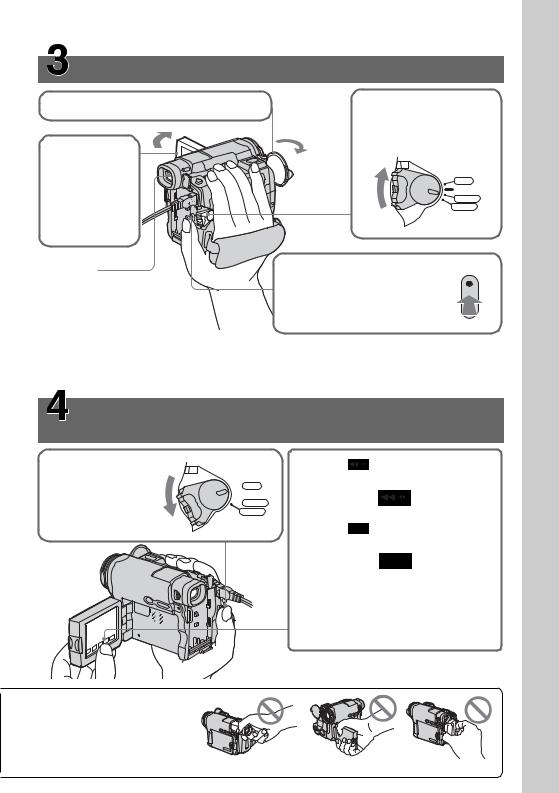
Recording a picture on the tape (p. 25)
1Open the lens cap (p. 25).
3Press OPEN to open the LCD panel. The picture appears on the screen.
Viewfinder
When the LCD panel is closed, pull out the viewfinder and look at the picture in it. Adjust the viewfinder lens to your eyesight (p. 31).
2Set the POWER switch to CAMERA while pressing the small green button.
POWER
VCR
OFF(CHG)
CAMERA
MEMORY
4Press START/STOP. Your camcorder starts recording. To stop recording, press START/STOP again.
When you purchase your camcorder, the clock setting is set to off. If you want to record the date and time for a picture, set the clock setting before recording (p. 22).
Monitoring the playback picture on the LCD screen (p. 39)
1Set the POWER switch to VCR while pressing the small green button.
POWER
 VCR
VCR
 OFF(CHG)
OFF(CHG)  CAMERA
CAMERA
MEMORY
2Press |
of the touch panel to |
rewind the tape. |
|
3Press |
of the touch panel to |
start playback.
Note
When using the touch panel, press operation buttons lightly with your finger supporting the LCD panel from the back side of it. Do not press the LCD screen with sharp objects.
Do not pick up your camcorder by holding parts as illustrated.
Viewfinder |
LCD panel |
Battery pack |
Guide Start Quick
9
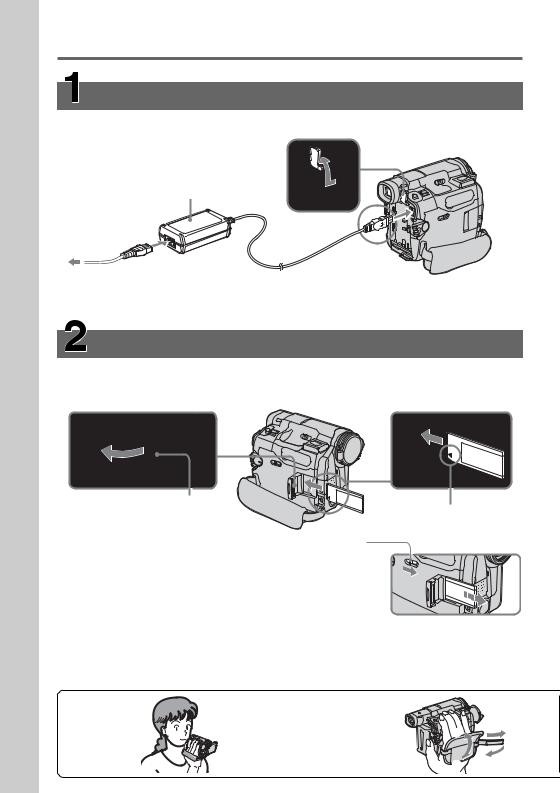
Guide Start Quick
Quick Start Guide – Recording on “Memory Stick” (DCR-TRV22/TRV33 only)
Connecting the power cord (p. 17)
Use the battery pack when using your camcorder outdoors (p. 16).
Open the DC IN jack cover.
AC Adaptor (supplied)
2 |
1 |
|
3
Connect the plug with its v mark facing the battery.
Inserting the “Memory Stick” (p. 109)
Open the lid of the “Memory Stick” slot. Insert the “Memory Stick” in the “Memory Stick” slot as far as it can go with the b mark facing down as illustrated, then close the lid.
Access lamp
b mark
To eject the “Memory Stick,” open the lid of the “Memory Stick” slot, slide MEMORY EJECT in the direction of the arrow.
While the access lamp is lit or flashing
Do not shake or strike your camcorder because your camcorder is reading the data from the “Memory Stick” or recording the data on the “Memory Stick.” Do not turn the power off, eject the “Memory Stick” or remove the battery pack. Otherwise, image data breakdown may occur.
How to hold |
Fastening the grip belt |
|
|
your camcorder |
Fasten the grip belt firmly. |
|
2 |
|
|
1 |
|
|
|
|
10 |
4 |
3 |
|
|
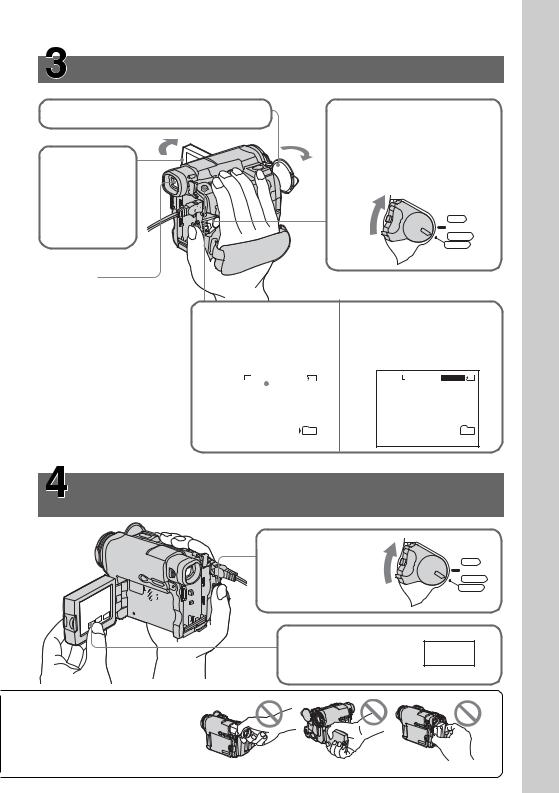
Recording still images on the “Memory Stick” (p. 114)
1Open the lens cap (p. 25).
3Press OPEN to open the LCD panel. The picture appears on the screen.
Viewfinder
When the LCD panel is closed, pull out the viewfinder and look at the picture in it.
Adjust the viewfinder lens to your eyesight (p. 31).
4Press PHOTO lightly. You can record when the green z stops flashing and remains lit.
When you purchase your |
640 FINE |
12 |
camcorder, the clock setting is |
|
|
set to off. If you want to |
|
|
record the date and time for a |
|
|
picture, set the clock setting |
|
101 |
before recording (p. 22). |
|
|
|
|
|
|
|
|
2Set the POWER switch to MEMORY while pressing the small green button.
Make sure that the LOCK switch is set to the left (unlock) position.
POWER
 VCR
VCR
OFF(CHG)
 CAMERA
CAMERA
MEMORY
5Press PHOTO deeply. The image when you press
PHOTO deeply is recorded on the "Memory Stick."
640 FINE
 101
101
Guide Start Quick
Monitoring the playback still image on the LCD
screen (p. 135)
1Set the POWER switch to MEMORY while pressing the small green button.
2Press PLAY. The last recorded image is displayed.
POWER
 VCR
VCR
OFF(CHG)
 CAMERA
CAMERA
MEMORY
PLAY
Do not pick up your camcorder by holding parts as illustrated.
Viewfinder |
LCD panel |
Battery pack |
11 |
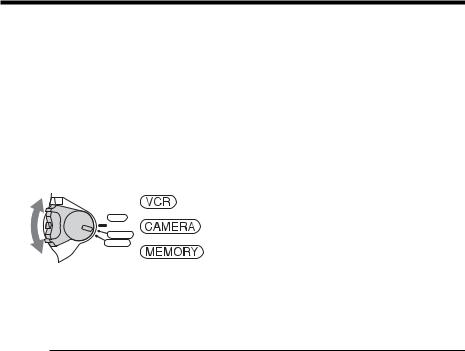
— Getting Started —
Using this manual
The instructions in this manual are for the 3 models listed in the table below. Before you start reading this manual and operating your camcorder, check the model number by looking at the bottom of your camcorder. The DCR-TRV33 is the model used for illustration purposes. Otherwise, the model name is indicated in the illustrations. Any differences in operation are clearly indicated in the text, for example, “DCR-TRV33 only.”
As you read through this manual, buttons and settings on your camcorder are shown in capital letters.
After “Advanced Recording Operations” section of this manual, position of the POWER switch is shown by the icons below.
POWER |
: Set the POWER switch to VCR. |
 VCR
VCR
OFF(CHG) : Set the POWER switch to CAMERA.
CAMERA MEMORY
: Set the POWER switch to MEMORY. (DCR-TRV22/TRV33 only)
When you carry out an operation, you can hear a beep to indicate that the operation is being carried out.
Types of differences
DCR- |
TRV19 |
TRV22 |
TRV33 |
|
Viewfinder |
B&W |
Color |
Color |
|
MEMORY mark* |
— |
z |
z |
|
(on the POWER switch) |
|
|
|
|
AUDIO/VIDEO jack |
z** |
z |
z |
|
S VIDEO jack |
z** |
z |
z |
|
z |
Provided |
|
|
|
— |
Not provided |
|
|
|
*The models with MEMORY marked on the POWER switch is provided with memory functions. See page 106 for details.
**Output only
12
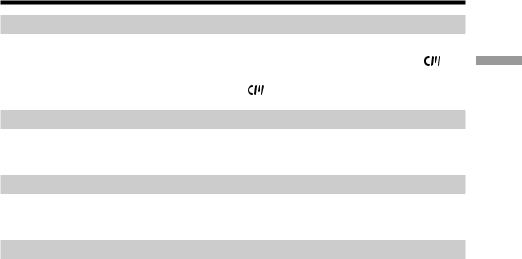
Using this manual
Note on Cassette Memory
Your camcorder is based on the DV format. You can use only mini DV cassettes your camcorder. We recommend that you use a cassette with Cassette Memory .
Cassettes with Cassette Memory have (Cassette Memory) mark.
Note on TV color systems
TV color systems differ depending on the country or area. To view your recordings on a TV, you need an NTSC system-based TV.
Copyright precautions
Television programs, films, video tapes, and other materials may be copyrighted. Unauthorized recording of such materials may be contrary to the copyright laws.
Note on connecting other equipment
When you connect your camcorder to other video equipment or a computer using the USB cable or i.LINK cable, observe the shape of the jack.
If you forcibly insert the plug, the jack may be damaged and they may result in a malfunction of your camcorder.
Started Getting
13
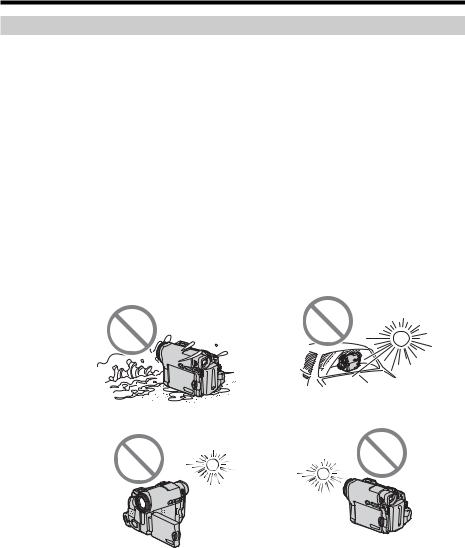
Using this manual
Precautions on camcorder care
Lens and LCD screen/finder (on mounted models only)
•The LCD screen and the finder are manufactured using extremely high-precision technology, so over 99.99% of the pixels are operational for effective use. However, there may be some tiny black points and/or bright points (white, red, blue or green in color) that constantly appear on the LCD screen and the finder. These points are normal in the manufacturing process and do not affect the
recording in any way.
•Do not let your camcorder get wet. Keep your camcorder away from rain and sea water. Letting your camcorder get wet may cause your camcorder to malfunction. Sometimes this malfunction cannot be repaired [a].
•Never leave your camcorder exposed to temperatures above 60°C (140°F), such as in a car parked in the sun or under direct sunlight [b].
•Be careful when placing the camera near a window or outdoors. Exposing the LCD screen, the finder or the lens to direct sunlight for long periods may cause malfunctions [c].
•Do not directly shoot the sun. Doing so might cause your camcorder to malfunction. Take pictures of the sun in low light conditions such as dusk [d].
[a] |
[b] |
[c] |
[d] |
14

Checking supplied accessories
Make sure that the following accessories are supplied with your camcorder.
1 |
|
|
2 |
3 |
|
|
|
|
|
|
Getting |
4 |
5 |
6 |
7 |
8 |
Started |
|
|||||
9 |
q; |
qa |
qs |
|
|
1AC-L15A/L15B AC Adaptor (1), Power cord (1) (p. 17)
2NP-FM30 rechargeable battery pack
(1) (p. 16)
3 A/V connecting cable (1) (p. 44)
4Wireless Remote Commander (1) (p. 75)
5Size AA (R6) battery for Remote Commander (2) (p. 217)
6 Shoulder strap (1)
7 Lens cap (1) (p. 213)
8 Shoe cover (1) (p. 98)
9“Memory Stick” (1) (DCR-TRV22/ TRV33 only, p. 106)
0 USB cable (1) (p. 148)
qa CD-ROM (SPVD-010 USB Driver) (1) (p. 153, 171)
qs Cleaning cloth (1) (p. 206)
Contents of the recording cannot be compensated if recording or playback is not made due to a malfunction of the camcorder, storage media, etc.
15
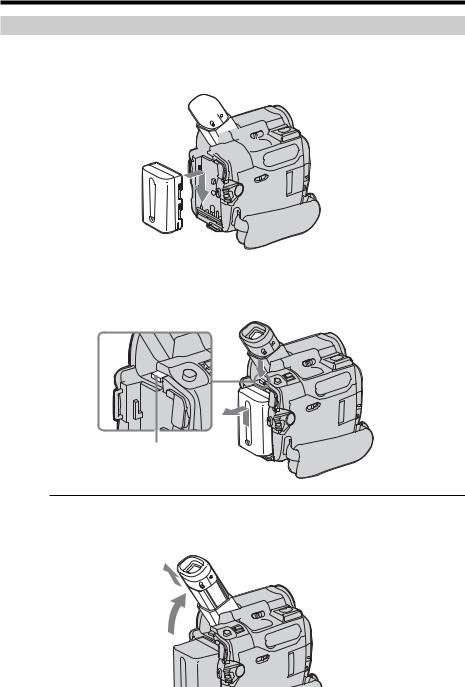
Step 1 Preparing the power source
Installing the battery pack
(1) Lift up the viewfinder.
(2) Slide the battery pack down until it clicks.
1
 2
2 

To remove the battery pack
(1) Lift up the viewfinder.
(2) Slide the battery pack out in the direction of the arrow while pressing BATT down.
BATT release button
If you use the viewfinder when a large capacity battery pack is installed
If you install the NP-FM70/QM71/QM71D/FM91/QM91/QM91D battery pack on your camcorder, extend the viewfinder, and lift up the viewfinder to a comfortable angle.
16
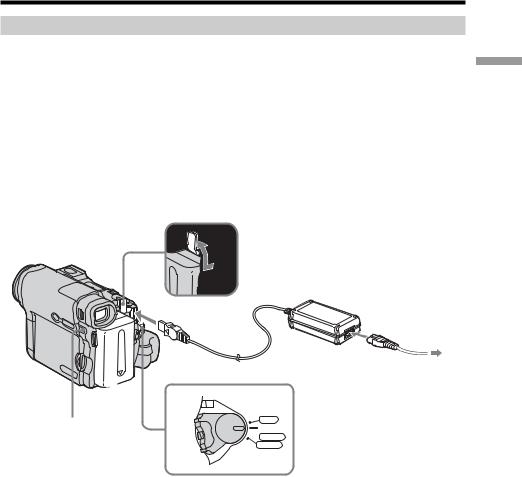
Step 1 Preparing the power source
Charging the battery pack
Use the battery pack after charging it for your camcorder.
Your camcorder operates only with the “InfoLITHIUM” battery pack (M series). See page 200 for details of “InfoLITHIUM” battery pack.
(1) Install the battery pack on your camcorder.
(2) Connect the AC Adaptor supplied with your camcorder to the DC IN jack with the v mark on the DC plug facing the battery.
(3) Connect the power cord to the AC Adaptor. (4) Connect the power cord to a wall outlet. (5) Set the POWER switch to OFF (CHG).
The CHG lamp lights up when charging begins. After charging is completed, the CHG lamp goes out (full charge).
|
2 |
3 |
1 |
5 |
|
|
POWER |
|
CHG lamp |
|
VCR |
|
OFF(CHG) |
 CAMERA
CAMERA
MEMORY
Started Getting
After charging the battery pack
Disconnect the AC Adaptor from the DC IN jack on your camcorder.
17

Step 1 Preparing the power source
Note
Prevent metallic objects from coming into contact with the metal parts of the DC plug of the AC Adaptor. This may cause a short-circuit, damaging the AC Adaptor.
When you use the AC Adaptor
Place the AC Adaptor near a wall outlet. While using the AC Adaptor, if any trouble occurs with this unit, disconnect the plug from a wall outlet as soon as possible to cut off the power.
Note on the CHG lamp
The CHG lamp flashes in the following cases:
–The battery pack is not properly installed.
–Something is wrong with the battery pack.
Charging time
Battery pack |
Full charge |
NP-FM30 (supplied) |
145 |
|
|
NP-FM50 |
150 |
NP-FM70 |
240 |
NP-QM71/QM71D |
260 |
|
|
NP-FM91/QM91/QM91D |
360 |
|
|
Approximate minutes at 25°C (77°F) to charge an empty battery pack.
The charging time may increase if the battery’s temperature is extremely high or low because of the ambient temperature.
18

Step 1 Preparing the power source
Recording time
DCR-TRV19/TRV22
|
|
Recording with |
Recording with |
||
Battery pack |
the viewfinder |
the LCD screen |
|||
|
|
Continuous |
Typical* |
Continuous |
Typical* |
NP-FM30 (supplied) |
125 |
65 |
90 |
45 |
|
NP-FM50 |
200 |
105 |
150 |
75 |
|
|
|
|
|
|
|
NP-FM70 |
415 |
215 |
310 |
160 |
|
|
|
|
|
|
|
NP-QM71/QM71D |
485 |
255 |
365 |
190 |
|
NP-FM91/QM91/QM91D |
725 |
380 |
550 |
290 |
|
DCR-TRV33 |
|
|
|
|
|
|
|
|
|
||
|
|
Recording with |
Recording with |
||
Battery pack |
the viewfinder |
the LCD screen |
|||
|
|
Continuous |
Typical* |
Continuous |
Typical* |
|
|
|
|
|
|
NP-FM30 (supplied) |
90 |
50 |
70 |
35 |
|
NP-FM50 |
150 |
85 |
120 |
65 |
|
NP-FM70 |
310 |
175 |
250 |
140 |
|
|
|
|
|
|
|
NP-QM71/QM71D |
365 |
205 |
290 |
165 |
|
|
|
|
|
|
|
NP-FM91/QM91/QM91D |
550 |
310 |
445 |
250 |
|
Approximate minutes when you use a fully charged battery pack
*Approximate number of minutes when recording while you repeat recording start/ stop, zooming and turning the power on/off. The actual battery life may be shorter.
Started Getting
19
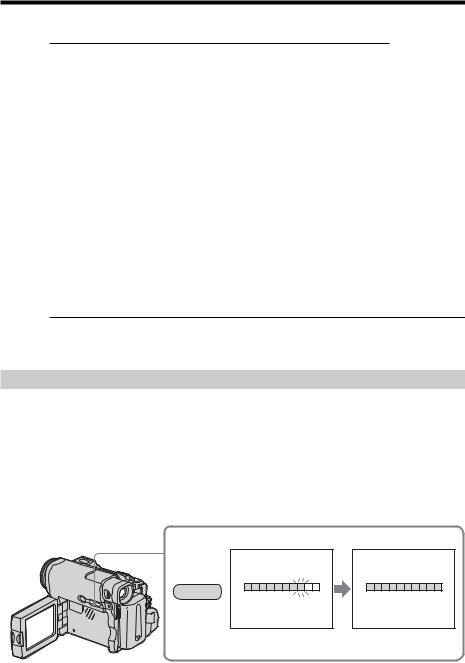
Step 1 Preparing the power source
Playing time
DCR-TRV19/TRV22
Battery pack |
Playing time on |
Playing time on with |
|
the LCD panel |
the LCD screen closed |
||
|
|||
NP-FM30 (supplied) |
100 |
150 |
|
|
|
|
|
NP-FM50 |
165 |
240 |
|
|
|
|
|
NP-FM70 |
345 |
495 |
|
NP-QM71/QM71D |
400 |
580 |
|
NP-FM91/QM91/QM91D |
605 |
865 |
|
|
|
|
|
DCR-TRV33 |
|
|
|
|
|
|
|
Battery pack |
Playing time on |
Playing time with |
|
the LCD panel |
the LCD screen closed |
||
|
|||
NP-FM30 (supplied) |
100 |
135 |
|
NP-FM50 |
160 |
220 |
|
|
|
|
|
NP-FM70 |
335 |
450 |
|
|
|
|
|
NP-QM71/QM71D |
390 |
530 |
|
NP-FM91/QM91/QM91D |
585 |
785 |
Approximate minutes when you use a fully charged battery pack
Note
Approximate recording time and continuous playing time at 25°C (77°F). The battery life will be shorter if you use your camcorder in a cold environment.
Checking status of battery pack – Battery Info
(1) Set the POWER switch to OFF (CHG). (2) Press OPEN to open the LCD panel. (3) Press DSPL/BATT INFO.
The battery charge level (the percentage of remaining battery time) and remaining battery time when using the LCD screen or viewfinder are displayed for about 7 seconds.
If you keep pressing DSPL/BATT INFO, the indicators will be displayed for about 20 seconds.
3
DSPL/BATT INFO
BATTERY INFO
BATTERY CHARGE LEVEL 0% 50% 100%
REC TIME AVAILABLE LCD SCREEN : 56 min VIEWFINDER : 72 min
During charging
BATTERY INFO
BATTERY CHARGE LEVEL 0% 50% 100%
REC TIME AVAILABLE LCD SCREEN : 70 min VIEWFINDER : 90 min
Fully charged
20

Step 1 Preparing the power source
Notes
•The BATTERY INFO indicator may not be displayed in the following cases:
–The battery pack is not installed.
–Something is wrong with the battery pack.
–The battery is exhausted.
•The BATTERY INFO indicator will not appear when you press DISPLAY on the Remote Commander when the POWER switch is set to OFF (CHG).
Battery Info
The number displayed as Battery Info is the approximate recording time.
While the remaining battery time is being calculated
“CALCULATING BATTERY INFO ...” is displayed.
If you press DSPL/BATT INFO with the LCD panel closed
The battery information appears on the viewfinder for about 7 seconds.
Connecting to a wall outlet
You can use your camcorder without worrying about the power shortage. Connect the AC Adaptor in the same way as you would when charging the battery pack.
PRECAUTION
The set is not disconnected from the AC power source (house current) as long as it is connected to the wall outlet, even if the set itself has been turned off.
Notes
•The AC Adaptor can supply power from a wall outlet even if the battery pack is attached to your camcorder.
•The DC IN jack has “source priority.” This means that the battery pack cannot supply any power if the power cord is connected to the DC IN jack, even when the power cord is not plugged into a wall outlet.
Started Getting
21

Step 2 Setting the date and time
Set the date and time when you use your camcorder for the first time. The “CLOCK SET” indicator will appear each time you set the POWER switch to CAMERA or MEMORY (DCR-TRV22/TRV33 only) unless you set the date and time settings.
If you do not set the date and time, “--- -- ----” and “--:--:--” are recorded on the tape or the “Memory Stick” (DCR-TRV22/TRV33 only) as the data code.
If you do not use your camcorder for about 4 months, the date and time settings may be released (bars may appear) because the built-in rechargeable battery installed in your camcorder will have been discharged (p. 207). In this case, charge the built-in rechargeable battery, then set the year, the month, the day, the hour and the minute.
(1) Set the POWER switch to CAMERA or MEMORY (DCR-TRV22/TRV33 only). (2) Press OPEN to open the LCD panel.
(3) Press FN (Function) to display PAGE1 (p. 23). (4) Press MENU to display the menu.
(5) Press r/R to select  , then press EXEC.
, then press EXEC.
(6) Press r/R to select CLOCK SET, then press EXEC. (7) Press r/R to select a desired year, then press EXEC.
(8) Set the month, day and hour with the same procedure as step 7.
(9) Press r/R to set the minute, then press EXEC by the time signal. The clock starts to move.
5 |
|
EXIT |
6 |
|
EXIT |
|
SETUP MENU |
–– : –– : –– |
SETUP MENU |
|
|
||
CLOCK SET |
|
CLOCK SET |
|
|
|
|
USB STREAM |
|
|
USB STREAM |
2003 JAN |
1 |
|
LANGUAGE |
|
|
LANGUAGE |
|||
DEMO MODE |
|
|
DEMO MODE |
|
|
|
|
|
|
|
12 |
00 AM |
|
|
EXEC |
RET. |
|
EXEC |
RET. |
|
7 |
|
EXIT |
8 |
|
EXIT |
|
SETUP MENU |
|
SETUP MENU |
|
|
||
CLOCK SET |
|
|
CLOCK SET |
|
|
|
USB STREAM |
2003 JAN 1 |
USB STREAM |
2003 JUL |
4 |
||
LANGUAGE |
LANGUAGE |
|||||
DEMO MODE |
|
|
DEMO MODE |
|
|
|
3 |
12 |
00 AM |
|
5 |
00 PM |
|
EXEC |
RET. |
|
EXEC |
RET. |
||
FN |
9 |
|
SETUP MENU |
|
EXIT |
SETUP MENU |
|
EXIT |
||
CLOCK SET |
|
|
|
|
CLOCK SET |
JUL 4 2003 |
|
USB STREAM |
2003 JUL 4 |
|
USB STREAM |
5:30:00PM |
|||
LANGUAGE |
|
LANGUAGE |
|
|
|||
DEMO MODE |
|
|
|
|
DEMO MODE |
|
|
|
|
|
|
|
|
|
|
|
5 |
30 |
PM |
|
|
|
|
EXEC |
RET. |
EXEC |
RET. |
To return to FN (Function)
|
Press EXIT. |
|
|
|
Note on the time indicator |
|
The internal clock of your camcorder operates on a 12-hour cycle. |
|
•12:00 AM stands for midnight. |
22 |
•12:00 PM stands for noon. |
|
